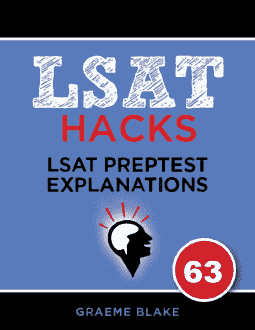QUESTION TEXT: A recent poll showed that almost half of the city's…
QUESTION TYPE: Paradox
PARADOX: About half of the town thinks the mayor is unethical. Yet about 52% support him, and that hasn’t changed since the allegations of unethical behavior.
ANALYSIS: People often have fixed opinions about politicians. If I told you something new about George Bush or Barack Obama, chances are very low that it would change your opinion. It is very hard to change anyone’s opinion on something they consider important.
So it could be the case that 48% (about half the town) of people thought that Mayor Walker wasn’t a good mayor. When they heard about the ethics violations, they added that to the list of things they hate about him.
Meanwhile, the other 52% like him. They liked him before the story about ethics violations and they still like him afterwards. They may not even believe the accusations of ethical violations.
People can be stuck in their ways.
___________
- CORRECT. The ethics violations are a red herring: they didn’t change anyone’s opinion, for good or ill.
- This doesn’t explain why people’s opinion of Walker didn’t change.
- This doesn’t explain why the other 80% of people did not change their minds.
- The anti-corruption groups don’t seem to have had much impact. This explains nothing.
- Nonetheless, about half of the people think the mayor was guilty of ethics violations. The question is: why didn’t his popularity sink?


What?? How does the fact that “the 48% who thought he was bad before the alleged ethics violations still think he is bad” help in explaining why the other 52% did not change their opinions from good to bad??
And being honest, I dont see why E is incorrect. E at least suggests a possible reason why the 52% stuck to their guns about him not being bad.
Suppose the two has two parties: Whigs and tories. The mayor is a tory. 52% of the town is tory, 48% whig. A is basically consistent with the idea that the whigs will oppose the mayor no matter what and the tories will support him no matter what. The ethics violations didn’t change anyone’s mind.
As for E, merely having a defense is not strong enough. Nearly anyone accused of something has a defense, but that fact doesn’t explain why almost no one changed their minds in this case.
Note: This is an old comment but I wanted to clarify the point.
I’m struggling with this question.
It asks for an explanation as to why his approval ratings (52%) did not decrease on account of the public reveal of ethics violations.
“E” gives a perfectly sound reason for this: he deflects his supporters attention away from himself and onto his staff’s incompetence. Therefore, those who supported him are convinced that he is not to blame and continue to support him despite the violations.
If the ethics violations comprise a red herring, as you state in your explanation, why would an answer choice (“A”) that takes as its major term “people who believe Walker is guilty of ethics violations” be in the running for a correct answer?
Is “A” really the answer, logically? Or is this question just a lousy trap?
Everyone will always have an excuse for their actions. But we know from common sense that an excuse is rarely 100% effective. For E to be right, the mayor would have had to completely convince everyone. Further, this answer somewhat contradicts the stimulus: we know that almost half of people believe the mayor is personally guilty of ethics violations. So it sounds as thought his excuse didn’t work!
You have to approach these situations as you’d approach real life. Would you instantly forgive a politician merely because they gave a justification for their actions? Would 100% of people around you? Those thoughts aren’t the reason E is wrong, but they should make you dig into it deeper and notice that we already know almost half of people think he is guilty.
A is easier understood if you take it to mean: people are split along partisan lines, and nothing ever changes their minds about politicians on their team and the opposing team. This is actually pretty close to how the USA works today.
Note: This is an old comment but I wanted to clarify the point.
I hate this question.